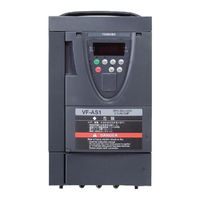Toshiba TOSVERT VFAS1-2750P Manuals
Manuals and User Guides for Toshiba TOSVERT VFAS1-2750P. We have 1 Toshiba TOSVERT VFAS1-2750P manual available for free PDF download: Instruction Manual
Toshiba TOSVERT VFAS1-2750P Instruction Manual (293 pages)
The new generation high-performance inverter
Table of Contents
Advertisement
Advertisement
